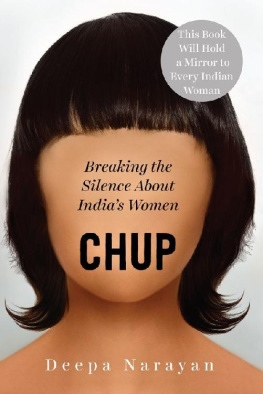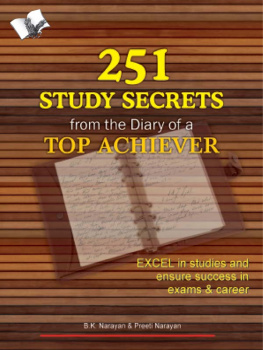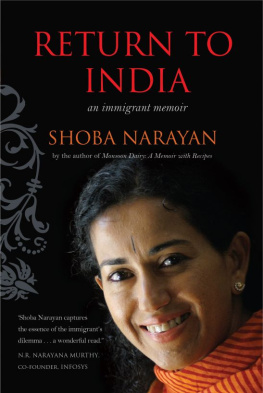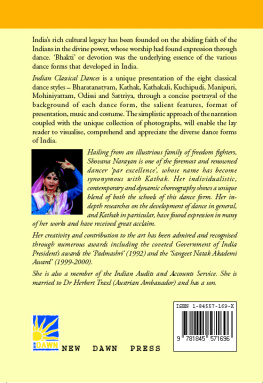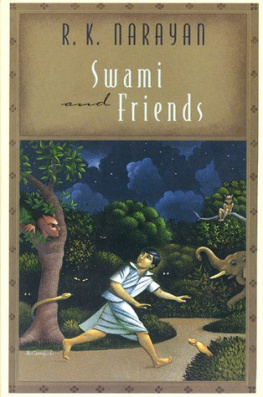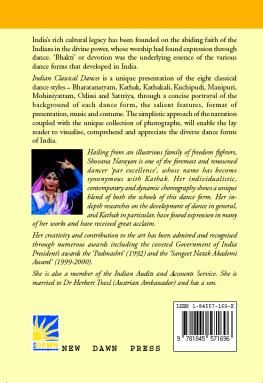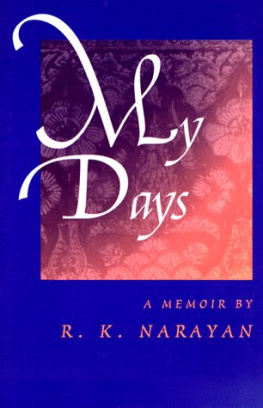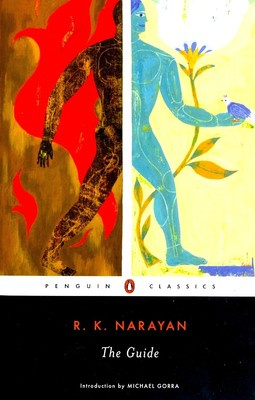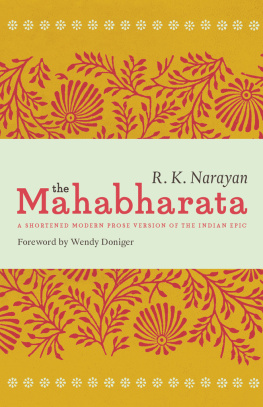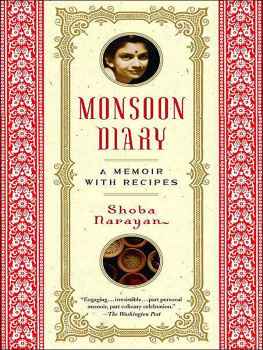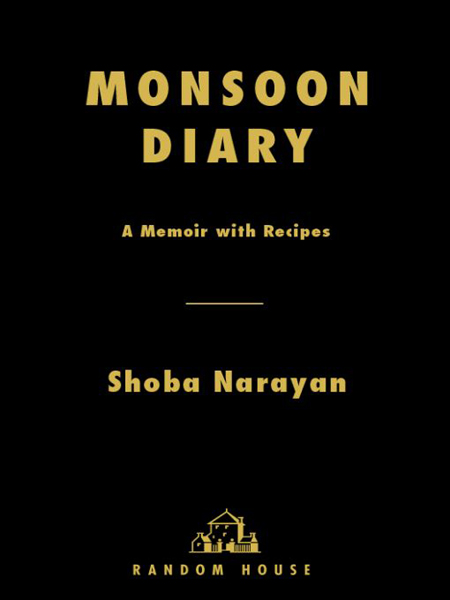
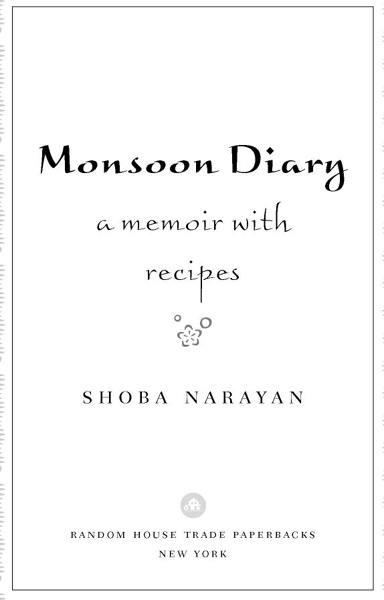
Table of Contents
To my parents,
Professor V. R. Narayanaswami
and
Mrs. Padma Narayanaswami
Praise forMonsoon Diary
[The recipes] are uniformly invitingindeed a minor difficulty about this book is that it provokes a pronounced surge of the appetite.... Monsoon Diary is the first book [Narayan] has written, but doubtless not the last.
JONATHAN YARDLEY, The Washington Post
Narayan, who grew up in Chennai, India, writes in humorous, tender prose about her family and their love of food.... Narayans sparkling, insightful narrative makes for a delightful cultural and culinary read.
Publishers Weekly
Weaving together stories from her remarkable life with tasty Indian vegetarian recipes, Narayan offers insights into Hindu culture and custom and contrasts her upbringing with life in her adopted America.... This is a delightful, stereotype-shattering memoir.
MARK KNOBLAUCH, Booklist
Shoba Narayan is that rarity in the food world: She has both a unique story and the lyrical skills to tell it.
REGINA SHRAMBLING,
New York Times and Los Angeles Times food writer
A taste of a life that is exotic yet familiar, Monsoon Diary is as pungent and satisfying as a good curry. Reading it made me want to get on a plane to Indiaor at least eat in an Indian restaurant.
SHARON BOORSTIN,
author of Let Us Eat Cake:Adventures in Food and Friendship
Acknowledgments
WHEN WRITING a first book, it is tempting to acknowledge everyone who has meant something to you in case you never write another. I will refrain from doing that and confine my acknowledgments to those people who have helped me with this book.
This book is dedicated to my parents. Like gentle if somewhat harried shepherds, they have steered my brother and me through our chaotic lives.
My mother always believed in my writing. More important, she made me believe that I was a writer, a good one at that. Without the strength of her conviction, I could not have written this book. She has been an incredible role model and one of the biggest influences on my life and character.
My father bequeathed to me his love for the English language, instructed me numerous times to pick up the dictionary, and trained his meticulous eye over my words, but only when I asked him to. He has always accepted and loved me even when I was a foulmouthed, rebellious brat whom even I couldnt stand.
Most people experience an epiphany of sorts when they become parents. Mine was to realize how tricky parenting is, and what my parents must have gone through to raise us. After obeying them, resenting them, and rebelling against them, I have come full circle into enjoying them for who they are, quirks and all. Together they have been the sail and ballast to my ship. I have always loved them. Only recently have I started cherishing them. I hope all of this comes through in this book.
This book would never have come into being without the support and assistance of many people.
Professor Sam Freedman of the Columbia Journalism School taught me everything I know about the book-writing process. I hope I can live up to the standards he set.
In her incarnation as the New York Times restaurant critic, Ruth Reichl sowed the seeds of my career in food writing. As editor in chief of Gourmet magazine, she has continued her support. To her, I owe a debt of gratitude.
Elizabeth Kaplan championed my writing attempts and was my agent for this book. Her enthusiasm and encouragement have sustained me.
Pamela Cannon took a bet on this book and was its first cheerleader.
Mary Bahr, my editor, shaped this book with grace and charm. She knew when to cheer me on and when to let me be. Her instinct and guidance were right on target.
My brother, Shyam, is an unwitting character in this book. He has enriched my life in ways big and smalleven if I didnt think so as a child. I rely on him always.
My husband, an intensely private man, had the generosity of spirit to let me write about our marriage for the sake of this book and, by default, my career. His combination of cheerleading and critiquing has made me a better writer and a better person.
From the beginning, my in-laws, Padma and V. Ramachandran, have treated me like a daughter. I have asked them numerous questions about multiple subjects at moments when they least expected it. I am lucky to have their knowledge, wisdom, love, and support.
In the company of my two sisters-in-law, Lakshmi Krishnan and Priya Sunder, I have experienced the delights of sisterhood, something that I missed as a child. The recipes included in this book have benefited from their input and careful eye.
I would also like to thank Sybil Pincus at Random House for her attention to detail; my friend Asha Ranganathan for information about restaurants in Bombay; my Manhattan book group for helping me enjoy books, food, and martinis once a month; Janice Tannin for testing the recipes; Ann La Rue for her unqualified support in all my projects, including this one; Dave Matlow for his editorial eye and the Shoba file; my neighbors Prabha-mami, Nagarajan-Mama, Sumathi-ka, Babu-anna, Vijaya-aunty, and Nithya-uncle for giving me happy childhood memories, many of which I have written about in this book; my uncle V. R. Krishnamoorthy and aunt Lakshmi for letting us run riot through their house all summer long; my uncle T. V. Venkateswaran and cousin Sanjay Monie for lending photos from their archives; my uncle T. V. Raghuraman for his memoirs; Chhokpa and Mary for helping me in ways too numerous to list.
Writing, or, for that matter, any creative enterprise, involves the hubris of taking oneself seriously, sometimes too seriously. Last, I would like to break my rule and acknowledge two individuals who had very little to do with this book but helped immeasurably in preventing me from getting too self-involved. Like all children, my daughters, Ranjini and Malini, live with an intensity that is hard to ignore. Their smiles and demands did more than distract me from the computer; they gave me perspective.
To all those whom I have inadvertently left out, I offer my apologies and the promise: in my next book.
Prologue
FOR ONE WHO EATS so little, my father has an unquenchable fascination with food. A petite, lithe man with the curiosity of an inventor and the conflicted soul of an artist, he loves to try new thingsin small doses, at his own pace.
When he first visited me as a newlywed in America, he spent the entire winter making up an alphabetized list of all the foods he had never tried, and systematically went about trying them. He started with avocadoes, which are unknown in tropical South India, and quickly moved on to anise candy, chipotle peppers, Etorki cheese, Fig Newtons, Kettle chips, molasses, quince, tomatillos, zahtar, and everything in between.
We never knew what he would come back with when he visited the grocery store. Once he bought a whole case of persimmons, which, he informed us, belonged to the genus Diospyros and meant fruit of the Gods. I considered myself an adventurous eater, but I had never tried a persimmon before. My husband, self-confessedly finicky, viewed the orange fruits with suspicion. Not wanting to hurt the feelings of his visiting father-in-law, he took a tentative bite and puckered his face. My mother and I followed my husbands example and experienced the same reaction. Even one persimmon was too hard, tart, and astringent to be palatable. What were we going to do with twelve of them?
Next page

